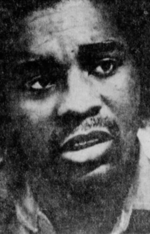 AP A 20-year-old black man living in Gary, Indiana, Larry Hicks had no criminal record when he was arrested for a double murder in 1978. On February 4, 1978, Hicks agreed to help his neighbors, two women, move their furniture out of their apartment. Bernard Skates, the boyfriend of one of the women, was also helping with the move, as were two acquaintances of the women – 27-year-old Norton Miller and 25-year-old Stephen Crosby. Hicks was a non-drinker and reported that he had become frustrated with the other men, whom he said were drinking heavily during the move-out, and left the neighbors’ apartment before midnight to go back home. The next morning, Norton Miller and Stephen Crosby were found stabbed to death in an alley, with a trail of blood leading back to the apartment where Hicks had been helping to move furniture. The police went to the apartment, and found Bernard Skates, covered in blood, as well as the two women. All three denied involvement in the crime and implicated Larry Hicks in the murders. Hicks was brought into police custody, though no physical evidence linked him to the crime. A few days later, Skates reportedly told fellow inmates that Hicks had not been involved in the murder, but before he could testify, he was found dead in his cell. Hicks was brought to trial in August 1978 and convicted of murder in a day and a half, primarily on the inconsistent testimony of the two female neighbors whom Hicks had been helping. The attorney representing Hicks, Robert Vegter, seemingly did nothing to defend him, though Hicks maintained that he was innocent throughout his arrest and trial. Hicks was sentenced to death in the electric chair. His execution date was set for June 1, 1979, and he was placed on Indiana’s death row. Hicks remained on death row until two weeks before his scheduled execution, at which time Indianapolis attorney Nile Stanton met with him and determined that he had a strong case for innocence. Stanton subjected Hicks to lie detector tests with regard to his involvement in the murders and his version of events on the evening of the murders, and Hicks passed. Shortly before Hicks was scheduled to be executed, the execution was stayed because of his pending appeal. Based on the conclusion of the court that Hicks had not been mentally competent to stand trial at his original trial, Hicks was granted a retrial. At the second trial, one of the two female witnesses recanted her previous testimony and said she could not recall what had happened the night of the murder. A private investigator hired by Nile Stanton had also discovered that the knife in evidence was not the actual murder weapon. In addition, he had found small details of Hicks’ version of events that could be independently verified, while the testimony from the two female eyewitnesses was inconsistent and not otherwise verifiable. The second jury acquitted Hicks of all charges on November 21, 1980. Hicks was released after serving almost three years in prison. – Researched by Eamon McMahon
|